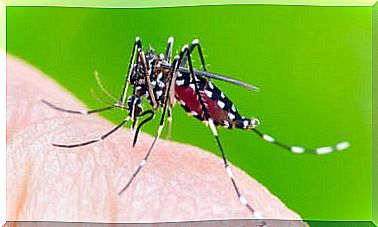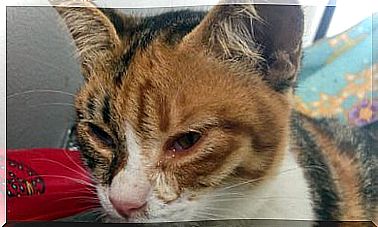Demodicosis Of The Dog: Causes, Symptoms And Treatment

Demodicosis is a parasitic skin condition that causes hair loss, skin inflammation, and itching. If your dog suffers from it, timely treatment is very important!
This disease is not contagious: it cannot be passed on to other dogs or humans. Demodicosis only develops in dogs that are particularly susceptible to it.
Causes that can lead to demodectic disease
Demodex mites are particularly comfortable with hairy mammals and spread very quickly. When these parasites get out of hand , hair loss and skin inflammation can result.
Demodex mites are particularly found on the dog’s hair follicles and sebum and apocrine sweat glands.

But why do some dogs develop a disease from demodex mites? If the immune system of your four-legged friend is weakened, these parasites can spread uncontrollably.
Most of the time, however, it is a hereditary disease, so it is recommended to prevent the affected animals from reproducing.
Stress is also one of the main triggers , so you should pay close attention to whether the illness occurs as a result of stress, for example due to changes in the dog’s living conditions (moving, new family member, loss …).
What are the symptoms of demodicosis?
Demodicosis can take several forms in dogs:
- Localized demodicosis: Affected dogs usually show isolated hairless or hairless areas, often on the head (often around the eyes) and on the neck. Puppies and young dogs often suffer from this type of demodectic disease, and the disease usually disappears on its own as soon as the animals’ immune system develops. Experts believe that localized demodicosis is not hereditary.
- Generalized demodicosis: in this case, skin changes are visible all over the body. The course of the disease depends on the severity of the immune disorders. Focal or diffuse hair loss occurs, with the head area usually being particularly affected. The skin is oily and the dog’s odor is intense. In addition, papules and pustules appear, which can also bleed. Some dogs with generalized demodicosis also have a fever, loss of appetite, and depression. This type of demodicosis is mostly genetic.
- Pododemodicosis: This disease manifests itself exclusively in the area of the paws. This leads to secondary injuries, which are usually difficult to heal. There may be swelling, pain, and itching on the paws. Certain breeds of dogs are particularly predisposed to this type of demodicosis.
Treatment of demodicosis in dogs
If you are concerned that your dog may have this skin condition, you should get him checked by a veterinarian as soon as possible. Medical treatment is carried out by eliminating the causative mites and controlling secondary infections.
First, the hair is removed from the affected areas. If injuries are present, they will be treated accordingly. Antibiotics are usually given.
The vet usually prescribes Amitraz for external therapy, which can be found in Germany under the name Extodex®, to kill the mites. After a while, a new skin sample is analyzed to determine whether the number of Demodex mites has decreased.

In order to avoid relapse, it is very important to find out the exact causes. If the illness is due to stress or a weakened immune system, the dog can be treated accordingly.
However, if the animal is genetically predisposed, sooner or later the disease will recur.
Tips for prevention against demodicosis
To minimize the risk, you can put the following preventive measures into practice:
- Regular deworming as well as external protection and the elimination of parasites are essential. Get advice from your vet and don’t forget to keep the vaccination calendar.
- Good quality nutrition that needs to be adjusted for race, size, age and other factors is also an important requirement.
- It is best to sterilize both males and females. This can prevent stress while the animals are in heat.
Remember, dogs with genetic demodicosis shouldn’t reproduce! Also, avoid giving corticosteroids and other medications that put a strain on the immune system.
Source cover picture: Andrew.









